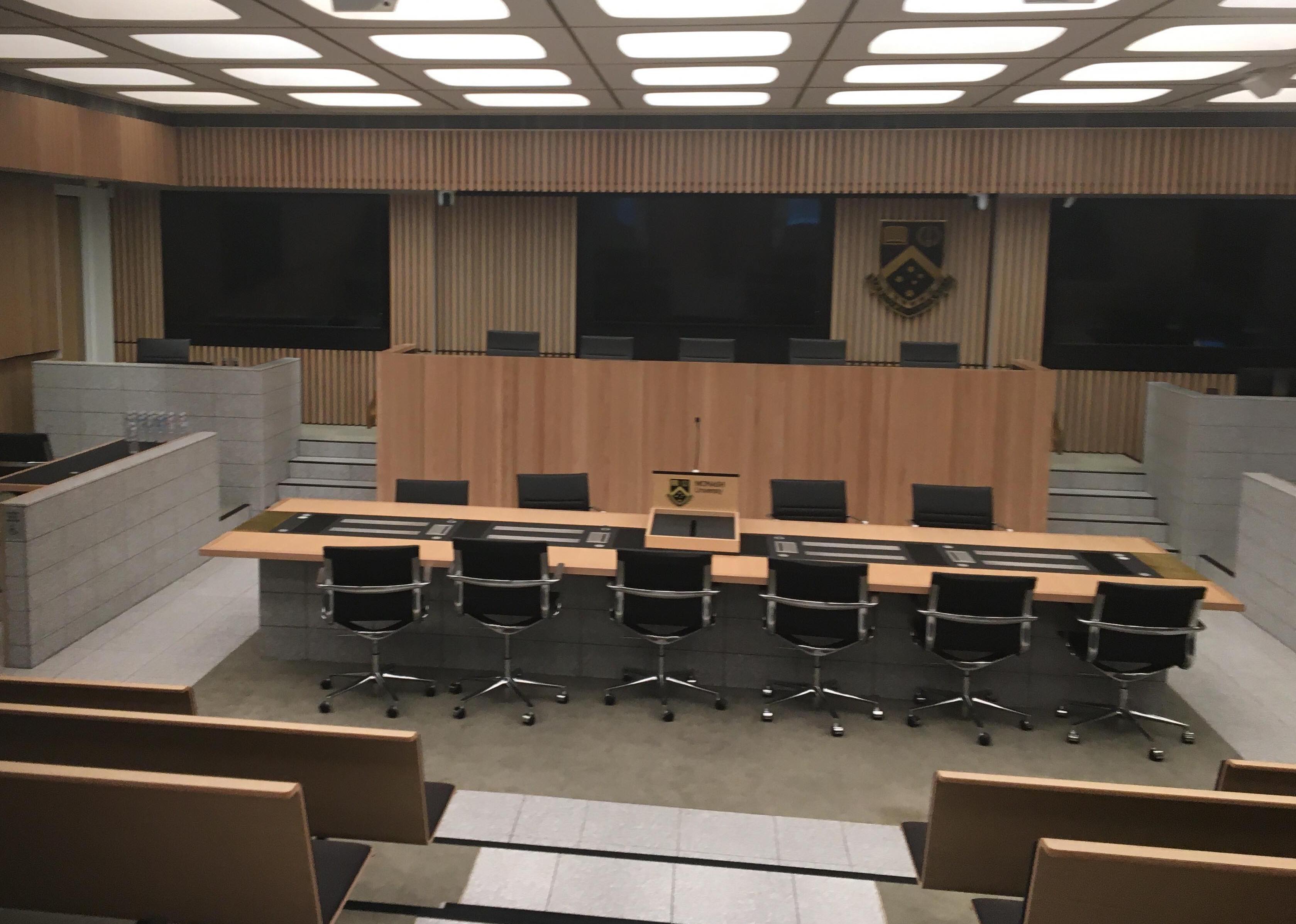In July this year, I headed off to Albuquerque to present at the annual Society for Psychological Study of Social Issues (SPSSI) conference in New Mexico, USA alongside my fellow PhDers, Tulsi Achia, Morgana Lizzio-Wilson. I hadn’t been to a SPSSI conference, or to the States, and I didn’t know much about Albuquerque, (except that is was where the TV Show Breaking Bad was set and filmed, and that Bugs Bunny should have taken that left turn there), a quick Google revealed that Albuquerque was a great location for this year’s SPSSI Conference. It is rich in history (First Nations and Spanish), has absolutely stunning landscape, and, excitingly, is the hot air ballooning capital of the world. Which gave me a few things to look forward to, as well as the conference.


I’d decided to head to SPSSI this year, as Morgana had been the year before, and she’d come back speaking very highly of the conference, and its format. As the name suggests, SPSSI is very much focused on social issues, and the conference structure allows researchers not only to share their work in a more traditional format, it also provides a space for them to have meaningful discussions around the practical implications of this work.
We arrived in Albuquerque on Monday afternoon, which gave us a few days to get used to the new time zone, the 39-degree heat (!), and for me to check out the amazing New Mexican landscape from a few thousand feet above. The pre-conference Policy Workshop kicked off on Thursday, with a number of established and early career researchers speaking to their research, providing some great examples of how their work had been applied in a real world context. They also provided some valuable advice on working with community and industry organisations to make this happen.
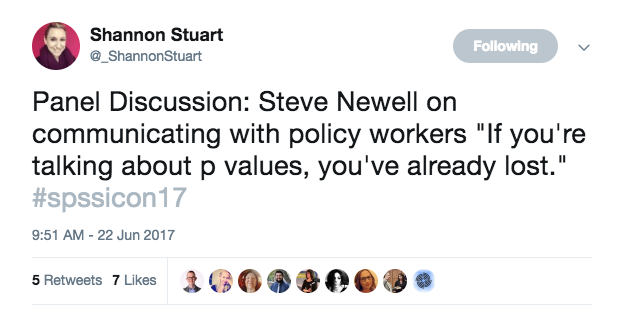
After the panel discussions, we were given the opportunity to meet other post grads, and work with them to identify and address a particular policy issue. We were divided into groups with similar research interests (e.g., gender, sexuality, intergroup relations, climate change, interpersonal violence, economic inequality, immigration and racial inequality and injustice) and asked to identify a social issue, and begin to develop ways in which to address this issue with evidenced based policy. Morgana and I were allocated to the gender/sexuality table, working with post grads from the University of Michigan and the University of Texas, Arlington. Given the research interests around the table, and the prevalence of the problem, our group discussed the development of a ‘product’ (i.e. a series of resources), designed to address harassment towards gender and sexual minorities on public transport. During the session, we were given a number of facilitation questions to help us structure our thinking, asking us to consider all of the stakeholders involved in the policy development process, as well as identifying various ways to facilitate communication with them. For example, writing policy briefs, reports and op-eds, and/or holding community meetings. At the end of this session, we all had the chance to present a short pitch to the rest of the groups, which was a great exercise to see how everyone approached their issues, and to see the strategies and theoretical frameworks each group used to tackle the various problems.
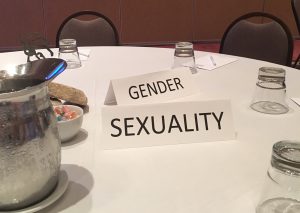
As well as the policy workshop, one of the main highlights of SPSSI for me was the ‘Interactive Discussions’. These sessions were facilitated group discussions that allowed for researchers to talk more informally about research, policy, and practice. Based on Morgana’s rave reviews about this format from last year, we decided to run our own discussion, roping in the wonderful Professor Kim Case, for some guidance and additional expertise. Whilst Tulsi’s PhD focuses specifically on allyship, we all have social justice research interests, and so we regularly walk in both activist and academic circles. Because of this, we’ve become aware of a disconnect between how activists and academics approach advantaged group allyship. Specifically, there are some academics and activists who disagree on the role of advantaged group allies in social movements. Given that advantaged group members incur fewer costs, and are perceived more positively when confronting prejudice (Eliezer & Major, 2012), many conclude that advantaged group members are key in promoting peace and deescalating intergroup conflict (e.g. Drury & Kaiser, 2014). However, there is also some emerging research to suggest that there can be some negative consequences of positive intergroup contact for the disadvantaged group, such as undermining engagement in collective action (Wright & Lubensky, 2009; Droogendyk, et al., 2016). Along with this research, some activists worry that continuing to centre and privilege advantaged group voices may reproduce inequality within social movements (Curtin & McGarty, 2016; Macomber, 2015). As such, the aim of our interactive discussion, ‘Reflecting on the Complexities of Advantaged Group Allyship’, was a chance to think about and talk through these issues with researchers and activists working in the area.
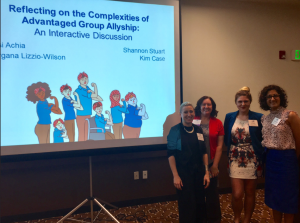
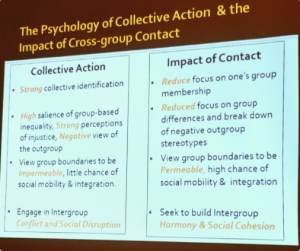
Given that Joan Ostrove, Stephen Wright and Lisa Droogendyk have already begun to address some allyship related issues in their recent work, we were thrilled to have them at the session, alongside other brilliant and committed academics/activists from across the US and Germany. While the topic of allyship and intergroup relations is complex, and the discussion definitely reflected this, the session was extremely productive. We all walked away from it with a renewed focus on making sure our research is more connected to the people that we’re researching, and using our various privileges for good, by doing the allyship and advocacy work in places that disadvantaged group members may not currently have access to. I’m very much looking forward to continuing the conversation beyond the session, as we share relevant citations and activist work with one another, ensuring that we incorporate their work in our own practice where possible.
One of the highlights for me as a PhD student at SPSSI was the incredibly welcoming environment, and the strong focus on mentoring. It was also worth noting that the work presented at the conference was diverse, and I was very excited to see a number of people present some really creative ways manipulate and measure variables in an applied context. It was also great to see established academics providing opportunities for students and early careers researchers to have a place in the discussion, often deliberately calling on students to speak, and offer our insights. For me, the conference was well worth the travelling distance (15+ hours on a plane) and the jetlag, and I would highly recommend it for any researchers interested in policy and social justice related work. The only downside was the focus on US related policy, which was understandable given the location. Although the main points could be transferred across contexts, I would love to see an Australian iteration of SPSSI in the coming years. We have an excellent community of social psychologists, and it would be great to have the infrastructure and networks in place to better connect with policy makers from across the country. So, if you’re a researcher or policy maker who’d like to work with me on helping to make that happen, please get in contact via email, Twitter, or ResearchGate!
In the meantime, the next SPSSI Conference will be held in Pittsburgh, Pennsylvania from June 29-July 1, 2018. There will also be a Post-Conference Policy Workshop on July 2, 2018. Hopefully, I’ll see you there!
References
Curtin, N., & McGarty, C. (2016). Expanding on psychological theories of engagement to understand activism in context (s). Journal of Social Issues, 72(2), 227-241.
Droogendyk, L., Wright, S. C., Lubensky, M., & Louis, W. R. (2016). Acting in solidarity: Cross‐group contact between disadvantaged group members and advantaged group allies. Journal of Social Issues, 72(2), 315-334.
Drury, B. J., & Kaiser, C. R. (2014). Allies against sexism: The role of men in confronting sexism. Journal of Social Issues, 70(4), 637-652.
Eliezer, D., & Major, B. (2012). It’s not your fault: The social costs of claiming discrimination on behalf of someone else. Group Processes & Intergroup Relations, 15(4), 487-502.
Macomber, K. (2015). “I’m Sure as Hell Not Putting Any Man on a Pedestal” Male Privilege and Accountability in Domestic and Sexual Violence Work. Journal of interpersonal violence, 0886260515618944.
Wright, S. C., & Lubensky, M. E. (2009). The struggle for social equality: Collective action versus prejudice reduction. Intergroup misunderstandings: Impact of divergent social realities, 291-310.
